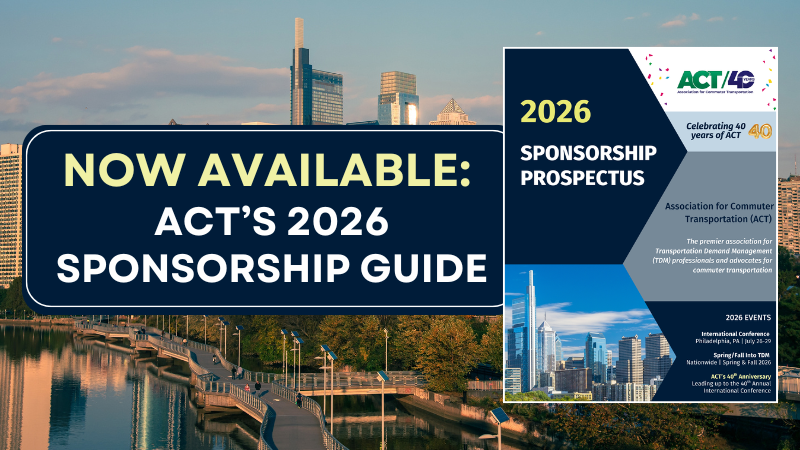ACT's Strategic Plan
Guiding the organization through 2025
The Association for Commuter Transportation (ACT) is the leading global voice and advocate for transportation demand management (TDM)– fostering economic growth, better commutes, environmental preservation, and community health. In recent years, ACT has experienced rapid growth in membership and programming as the TDM industry has gone through a resurgence as communities and employers look for cost-effective, innovative and impactful strategies to address their transportation and mobility challenges.
Our members reflect the diversity of those with a stake in this effort – corporations and institutions, local and state agencies, service and solution providers. ACT’s commitment is to advocate for thoughtful planning, programming, and policy that increases the efficiency of our transportation system – decreasing single-occupancy vehicle trips, advancing professionals and practice in the field, and building strong public and private support for TDM strategies.
The field of TDM has been changing rapidly as facilities, roads and transit are increasingly incorporating TDM principles into their design, and employers and employees are shifting practices and behavior with the rise of TDM strategies and infrastructure. The field has expanded from its early focus on air quality to broader issues of congestion and livability, employee attraction, retention and productivity, health and safety, road infrastructure, utilization and efficiency, and racial and socioeconomic equity.
In 2019, ACT undertook a comprehensive strategic planning process. Our Board designated a Task Force, along with outside consultants, to build a robust fact base and recommend strategic priorities and a roadmap for ACT. The group carried out interviews and focus groups with over 35 members as well as an in-depth member survey, along with extensive sector and comparables research. This plan will serve as a guiding document for ACT’s areas of focus, investments, and desired outcomes over the next 5 years.
This planning effort began with several strategic questions to be addressed:
- What will be the critical areas of evolution in TDM over the next 5 years, and what are the priorities and goals of ACT’s members?
- How can ACT uniquely shape the field and advance these goals?
- How can ACT leverage its scale and expertise to amplify and accelerate thoughtful policy and funding strategies?
- What do ACT’s members want and need to be most effective, and where can ACT add the greatest value in service of its members?
This strategic plan would not have been possible without the dedication, leadership, support and participation of countless individuals from within and outside of the membership. ACT would like to specifically call out and thank the members of the Board and individuals that participated in interviews and focus groups for their time and insights.

